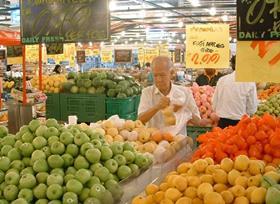
The early arrival of Ramadan this year will reduce supermarket promotions for traditional June-July fresh fruit imports in Malaysia, according to Retna Malar of Selangor-based marketing consultancy All About Fresh Produce.
Malaysian retailers traditionally push dates, dried fruit and nuts in the weeks before Ramadan and Eid al-Fitr (the religious holiday that markets the end of the fasting month), so cut back on promotions and shelf-space for other fresh produce, she said.
June-July is typically Malaysia’s peak import season for Southern and Northern Hemisphere fruits, such as cherries, apples and kiwifruit.
“Ramadan falling from late June to late July actually interferes directly with promotions of peak produce arrivals from the Southern and Northern Hemisphere,” said Malar. “This is because retailers advertising and display space is dedicated heavily to Ramadan and Eid-based products like dates.”
But Malaysian sales of imported cherries, apples and kiwifruit will not suffer at wet-market-level during this period, according to Malar.
This is because separate market trading areas are set up for Ramadan-focused products, so wet-market shelf-space remains the same.
“Having said that, the produce star of the Ramadan month is definitely the dates category,” said Malar, “followed by other fresh produce such as grapes, pomegranates and melons.”
A rise in fresh and pressed pomegranate sales is a new trend in Malaysia’s produce sector, Malar added.
“Although sales are not yet widespread, the fruit is creating a buzz at retail level and sales have increased in leaps and bounds,” she said.
“What really boosts pomegranate sales are juicing demonstrations,” Malar added. “Shoppers get to buy fresh pressed juice at selected supermarkets.”
Malaysian sales from fresh pressed juice are currently 300 per cent higher than whole-fruit sales, she said.
“In-store juicing demonstrations were popularised by Turkish Pomegranate suppliers, and has since caught on with South African pomegranates,” said Malar.



